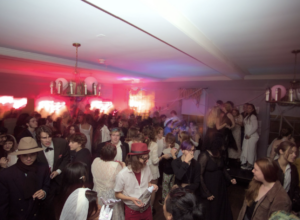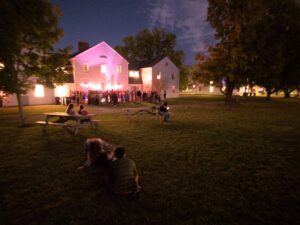
44.4% of students who responded to an anonymous form on artificial intelligence usage believe we’re doomed when it comes to the use of AI in the future. While many students stated they do not use AI for their homework or personal projects, questions arise from the benefits and downsides to AI in academic and creative settings.
“I think AI has the potential to be a great tool, however it needs to be made and used ethically. I think the issue we have been encountering recently is that people keep making and using AI tools for creative purposes, such as AI art or writing. Almost all of these AI tools that are available for public use are fed the work of real people without their consent and without giving them compensation for said work. These types of AI are essentially plagiarism, which is where the problem arises,” said an anonymous student.
This spring, Franny Choi is teaching a course titled: “Poetry and Technology.” This 4000-level literature course focused on the impact of AI, particularly ChatGPT, on literature and the history of technology’s effect on poetry and writing. Currently, there are writers suing ChatGPT for plagiarism and violating copyright, including Jodi Picoult and John Grisham. There is controversy around the value of the work of writers in these emerging spaces.
In discussion with Choi, she highlighted that foundational poetry methods and the authentic written word will always hold a special place in literary spaces. AI is something that stands out to those that seek it, such as STEM researchers and technological institutions. Though, even a student who has no interest in technology may turn to AI when their workload is too heavy and need a helping hand.
While AI and technology is interesting from a media studies perspective, like when analyzing pieces recommended by Choi like Technelegy by Sasha Stiles or Travesty Generator by Lillian-Yvonne Bertram, the question at an institution at Bennington is whether our students are overworked, turning to tools that inhibit them, rather than help.
“If you had a robot who always tied your shoes for you, would you ever have learned how to tie your shoes yourself?” An idea proposed by Computer Science professor Darcy Otto, a perspective on the use of AI is assisted with a background in technology.
The future of AI presents both significant promise and hazard, depending on the ethics of the development. Powered by advanced algorithms like ANNs (models inspired by the structure of the brain), ChatGPT, and image recognition, AI can revolutionize fields such as education and creative industries, providing new ways of thinking and learning that will prepare one for the world after school. However, like splitting the atom, AI’s potential for profound changes and catastrophic risks requires responsible use, threatening the ability to think completely for one’s self and to steal from the minds of others. The challenge lies in ethically harnessing AI to serve as a tool for innovation rather than a replacement for the human spirit.
Emerging AI raises questions on student’s ability to balance their work, the appropriate way to balance societal advancements compared to personal creativity, and the incentive behind each and every person using the AI. Artificial intelligence isn’t going anywhere— how do you want to see it used on Bennington Campus?
This coming Fall, Franny Choi is teaching “Feminist Writing by Women of Color, 1970s-80s,” “The ‘I’ of the Beholder,” and “Senior Projects in Literature.” Darcy Otto is teaching “Introduction to Computer Science 1: Programming and Computer Science” and “Systems 2: Software Architecture and Design-From virtual machines to compilers.”





Be First to Comment